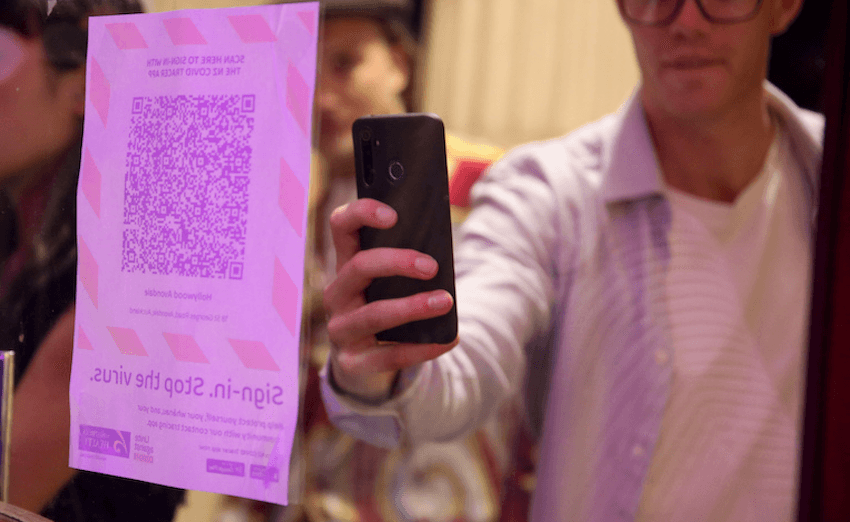Ignoring those QR codes when you drop into the supermarket? Can’t be bothered when you grab a coffee? The people serving you notice, and you’re freaking them out.
So far, New Zealanders’ use of the Covid-19 Tracer app has been notably woeful. Food industry workers who’ve watched streams of customers walk straight past their workplace’s QR codes know this all too well.
Things are looking slightly better this week with Ashley Bloomfield noting in yesterday’s Covid-19 update that there has been “some increased use of the Covid Tracer app”. Not really the most enthusiastic language in the world, but it’s certainly a good sign. The day after the Northland case was reported there were 20,000 new users of the app, meaning there’s now almost 2.5 million people registered. Clearly more and more people are wanting to be both scrupulous and assiduous when it comes to scanning in. This is definitely something to celebrate but we need to keep it up.
Christchurch-based hospitality worker Ellsie Coles says the number of customers who don’t scan in drives her “insane”.
“If you’re gonna go and sit in the corner and drink your coffee and interact with staff and other people coming through, the least you can do is sign in.”
While working at a cafe within a supermarket recently, Coles says staff faced consistent verbal abuse from customers when asked to sign in. Some customers who didn’t have the app and were asked to sign in manually didn’t trust staff with their information and gave names and phone numbers that were clearly fake. Coles says “it was awful, it was so difficult to deal with.”
Working long days and serving hundreds of different people each shift is typical for hospitality workers, so they bear a significant risk if there’s another community outbreak. Restaurant, cafe and bar jobs require close contact with patrons, whether you’re leaning over groups of people to put meals on tables, touching people’s used cutlery and glasses or taking drink orders from hordes of people yelling at you across a thin bar.
“People seem to think just because there’s no active cases in their area that they don’t need to keep signing in, without considering the further implications of that or what could happen,” says Coles.
The consequences of dodging those QR codes not only heightens the risk for the health of hospitality workers, but also for their livelihoods if we’re forced to go into lockdown again. For workers who already have low job security in an industry where employers have been accused of pocketing all or some of the wage subsidy, it can be concerning. You can’t work from home if you’re a barista, bartender or server.
“I’ll have no source of income if people don’t scan in and keep track of things, and yet people don’t look past that or consider anything other than themselves,” says Coles.
While working at an event for a corporate firm, Coles says she saw just three of the around 150 guests sign in. She remembers a bouncer asking a woman to sign in who then held her phone up to the scanning code without having the Covid Tracer app open. To Coles this type of behaviour reflects a complete disregard for staff wellbeing, health and safety.
“People need to realise that they can’t both undermine the importance of hospitality staff and their safety and then turn around and get upset because hospitality venues close because of Covid, whether that be because of the lockdown or financial reasons.”
Wellington restaurant worker Winnie* agrees. “I think this is part of an underlying issue – that there isn’t actually enough respect for hospitality workers in general.”
Winnie has anxiety, so it’s been even more difficult dealing with customers not signing in.
“In the hospitality trade everybody is trying to do their best to serve everyone, to be happy all the time, and I think over the past year it’s been really difficult”
On a shift at the restaurant, she overheard patrons talking about how they were yet to receive their results from Covid tests they had taken the day before. “That puts everyone in the restaurant at risk.”
“I think that signing in is a sign of respect and of teamwork.”
When supermarket worker Carla* is at the checkout she has a clear view of shoppers wandering into the store without signing in. She says her supermarket has plenty of QR posters on the front doors and around the shop.
The threat of the virus is particularly real for supermarket workers, who suddenly became essential workers as the pandemic hit last year. Overseas, research found grocery workers had a significantly heightened risk of catching Covid-19 compared to the general population. It’s especially concerning for Carla as she’s immune-compromised.
“For someone like me who has low immunity, I think it’s an important thing because if you get someone infected that came into my store, I’ll get a message straight away and I can start doing what I need to do.”
She’s trying to be positive about people’s response since the latest community transmission in Northland. “I think people are becoming more aware about how important it is to scan the Covid apps or at least take a note or write it in the book.”
Another lockdown would mean staying home for most of us. “But not all people are in that privileged position,” says First Union representative Tali Williams. Supermarket workers are immediately put on the frontlines and are “copping the risk”.
“Not doing your bit in terms of contact tracing puts everyone at risk in the country, but particularly vulnerable are those frontline essential workers that we rely on for survival when we do go into lockdown.”

